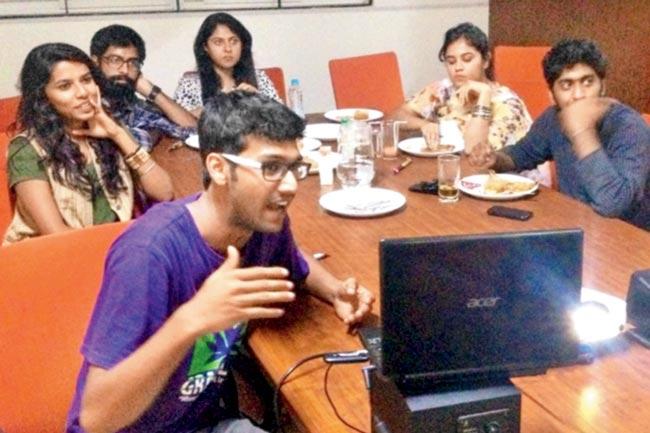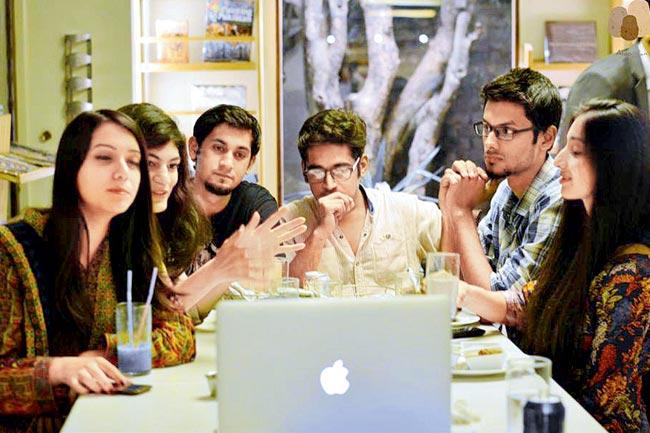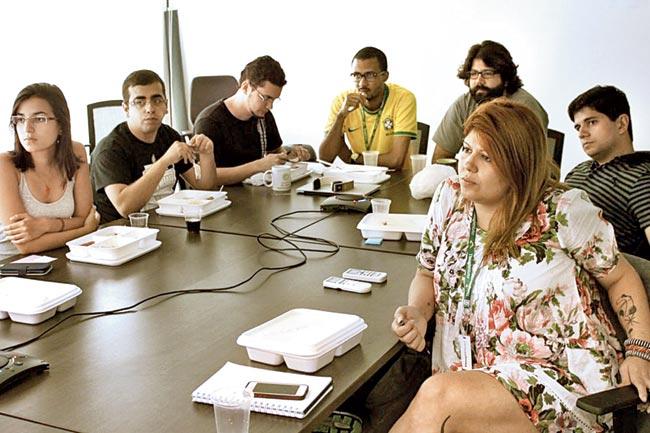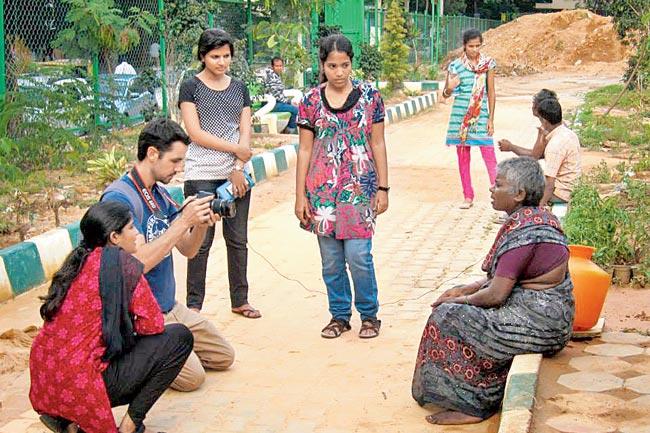Days before guns blazed on the India-Pak border, 12 youngsters from the two countries shared a meal as part of The Virtual Dinner Guest Project, an initiative which strives to establish meaningful dialogue between nations. This week, the India-Brazil video goes live, writes Kareena Gianani

Recently, at dinnertime, Gowri Om, a 22-year-old Bangalorean pursuing her Masters in Development, sat in a room with five colleagues from Campus Diaries, a youth initiative that focuses on publishing and storytelling.
ADVERTISEMENT
No one was eating, and all eyes were on a laptop which flashed the status of the Skype call which was underway to a similar group in Islamabad, Pakistan. In seconds, seven 20-something members from Islamabad’s tech start-up, Aloo Clan, waved at Om and the group. They discussed what they were eating (the biryani, chhole, makhni dal et al) and got down to business.

The groups were part of The Virtual Dinner Guest Project, started by Eric Maddox, a US documentary filmmaker, who believes that a dinner and dialogue on relevant matters can create cultural shifts between nations — especially those in conflict — ignore biased news reports, and create a more reliable media of their own.
In 2010, while Maddox was filming a documentary along the US-Mexico border, he connected a family in Ciudad Juarez, Mexico with another in Santa Fe, New Mexico. “It struck me that a meaningful discussion with people across borders is more meaningful than reading news reports about them.” Since February 2012, Maddox has connected 14 countries, across five continents, including the MENA region. The premise is simple — Maddox asks the teams to choose news reports about each other published in their national media, and the teams discuss their portrayals.

(Top) The team from India and Pakistan (above) with Usama Tauqeer (third from right) at the virtual dinner
Then, both teams go back and film a documentary, exchange the film, and meet again to discuss it.
“Initially, I would just connect people over dinner, but I soon realised it wasn’t sustainable, cut off from the laboratory of the real world,” says Maddox.
When India met Pakistan online
“I was curious to see how teams from two countries perennially in conflict react to each other — would there be heated debate, innate animosity?” Om remembers. The ambiance, she says, was cordial. Each team stuck to their stand when it came to the news reports, but discussed Kashmir, the BJP, women’s issues and the Partition amicably.
It was revealing, says Om, when the Pakistani team emphasised on the need for the world media to paint a realistic picture of Pakistan. “The world sees Pakistan only as a state in turmoil,” says Usama Tauqeer, the 21-year-old founder of Aloo Clan, who organised the Pakistani team. He explains that the meal gave the two teams a chance to discuss the Pakistani society which enjoys access to opportunities, social networks and has an informed, well-rounded outlook. “The discussion made me realise how skewed media portrayals are, and that they do not reflect the views of youth — Indian or Pakistani — on ground.

The team from Brazil at the dinner
At the end of the dinner, the Pakistani team suggested the Indian team make their documentary on what an average person on the street would like to tell Pakistan. The Indian team wanted the Pakistani team to film one on the misconception Pakistan thinks the world harbours about them.
For the documentary, Maddox insists that the teams speak to a cross-section of the society, which they did. Both documentaries featured messages ranging from accusatory to affable, but it was the result Om and Tauqeer say they are concerned about.
“We are a bunch of educated, privileged, liberal people — but the fact that we chose our words so carefully during the dinner hints at subconscious prejudice,” says Om thoughtfully. “This means nobody in either country knows everything. Just because we don’t hear certain kinds of voices, doesn’t mean they don’t exist,” she adds, referring to the vox-populi in the documentaries.
Tauqeer says he has friends all across the globe, but admits that he did tend to paint India in black and white, something he cannot do anymore. “We have more in common than Coke Studio,” he smiles.
Affecting change
For the project to implement real change, feels Maddox, these videos must be institutionalised, replicated on grassroots level, go viral in educational institutions, and become media outlets in themselves. “If global citizens could turn to such alternative media instead of the traditional, they would walk away with a richer cultural education. These videos are a standalone news source and if people, who want to know something about a country, turn to them instead of the media, they would be exposed to a whole new narrative,” says Maddox. He believes that a reactionary approach to the media culture will not work, and the best way to combat unethical journalism is to give people a platform for dialogue.
Dinner with Brazil
This week, Maddox will release the video featuring Indian and Brazilian teams that dined last week. Fathima Harris, a 22-year-old IT consultant at Thoughtworks, Bangalore, has participated in the discussion. “What do Indians really know about Brazil except the last football World Cup?” says Harris. Lilian de Munno, who works in the company’s Brazil office, says she was keen to know the similarities the nations shared.

the Bangalore team filming their video for The Virtual Dinner Guest Project with Eric Maddox
The discussion involved topics neither team expected to touch upon — female infanticide in India, casteism, the Commonwealth Games India hosted and rampant racism in Brazil. The most significant part of the exercise for both teams, however, was encountering some unflattering ground realities in their own countries as they filmed their respective documentaries. Harris, who asked people on the streets of Bangalore how opportunities for women in India could improve, ran into misogyny and support in equal parts. “I have learnt more about my own country and neighbourhood by being part of this project,” she says.
De Munno, on the other hand, was out on São Paulo’s streets, asking locals how the racial divide could be bridged. “I was both frustrated and bewildered to know that most locals aren’t even aware of how critical the race issue is here. Others passed the buck to the government and gave vague ‘solutions’,” she says. Harris and De Munno are now working on organising the virtual dinners with teams at their international offices and beyond.
“The best part of this project is that it uses existing technology — some may trivialise it saying it is nothing new, but how many have channelled this opportunity on a global level and seen their worldview change?” asks Om.
 Subscribe today by clicking the link and stay updated with the latest news!" Click here!
Subscribe today by clicking the link and stay updated with the latest news!" Click here!






